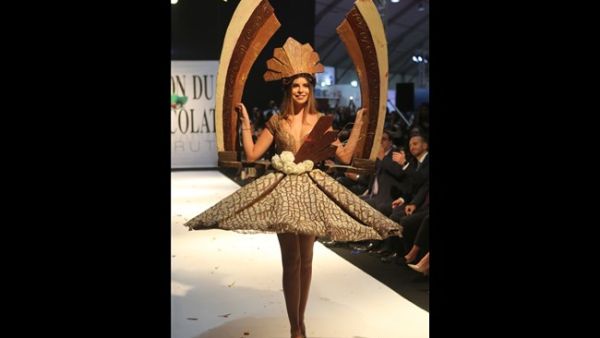An extravagant chocolate fashion show kicked off the fifth annual Salon du Chocolat Thursday afternoon. Alongside the sweet couture, the fair showcased many influences on Lebanon’s chocolate industry, such as healthy living and the approaching holiday season.
A runway scattered with chocolate was the centerpiece of the fair’s opening event, having fallen off apparel that was made of the sweet treat. Thirteen duos showcased their creations, realizing a fusion of food and fashion. The show featured a wide range of designs, from extravagant trains covered in fruit made of chocolate to elegant brown dresses layered in the dessert.
Marina Rizkallah, who designed one of the dresses, told The Daily Star that she used “festivals and carnivals” as the inspiration for a colorful creation. Illuminating her dress were fluorescent yellow details, while deep red wings rose up from behind all made from chocolate.
“It was actually really fun, once I did the base. Then we took a bucket of chocolate and started painting it,” Rizkallah said.
Each of the dresses was the product of collaboration between a fashion designer and a chef. The bases, made of inedible material, were created by the designer. They were then covered in chocolate, according to the whims of each duo.
“Actually it’s a lot of work, it’s a lot of details. It’s not only made of chocolate; it’s fabric and chocolate. So you need to have a certain kind of base, and then you stick your chocolates on it,” said Pierre Abi Haila, Lebanese chocolatier and a chef for one of the dresses. The most demanding aspect of the creative process was not the construction of the dress itself, but its presentation.
“It’s only challenging because there is this fashion show. There is a lady that is going to wear the dress and walk two times on the stage. So it is not an easy process to create something like this with a very fragile product,” he added.
But Rizkallah and her partner managed to find a way around these challenges: “While [the model] was standing there we took a glue gun, we took the chocolate and fixed up a few pieces, and she was ready to go.”
Wearable chocolate was not the only trend on display at Thursday’s opening. “Lebanese people are now more conscious about their health [because of] Instagram, Facebook and all the media. That’s why [our] brand, and all the brands actually, they are going through this trend. More healthy ingredients [and lower] calories,” said Shantal Semaan, brand manager for Domo, a company that produces boxed ingredients for homemade baked goods.
Others in the industry have come to understand that health aspects are an important factor for consumers in Lebanon, though they said they believe this was in part a seasonal phenomenon.
“People are tending to go healthier, but it also depends on the season. In summer everyone wants to be fit, so fruity pops are very popular. In winter people tend to get the creamier things,” said Evelina Hilal, operations manager at Pop City, a local popsicle company.
Between the hot and cold months are also different holidays, such as Christmas and Ramadan, that influence how much chocolate is sold and consumed.
Along with trends in the food market, chocolatiers are noticing how hard it is to keep a business afloat in the country in general. Chocolate has not traditionally been a staple in Lebanese cuisine, making Lebanon’s market harder to break into than in countries with a long tradition of chocolate consumption.
“Lebanon is not, when it comes to tradition, known as big consumer of chocolate. But since we live in the Middle East and we are surrounded by Arab countries whose consumption of chocolate is a lot higher than ours, Lebanon acts as a kind of a high-grade factory for chocolate,” said Joe Khoury from the marketing department at EMF, a Lebanese company that distributes chocolate to 16 countries in the Middle East and North Africa.
Selling high-end chocolate is particularly niche, and many in the industry are resorting to exporting to keep their business going.
“If you look at the recent customs numbers, more than 80 percent of the high-end chocolate produced in Lebanon [is] exported to the [other] Arab countries,” Khoury said.
The business of selling and distributing the dessert in Lebanon is a tough one, but Khoury says it is growing slowly, especially because of education about the product.
“Chocolate has been on a steady rise in Lebanon. It’s always paralleled by a certain craving [from] the populous for knowledge on how to actually have an educated opinion about chocolate,” he said.
Salon du Chocolat will be presenting a number of events until it closes Saturday evening, including a chocolate sculpture competition and live shows where festivalgoers can learn how to make their own creations. The chocolaty fashion pieces will be on display until the end of the festival.
This article has been adapted from its original source.








